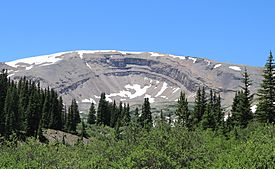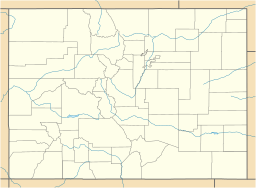Horseshoe Mountain (Colorado) facts for kids
Quick facts for kids Horseshoe Mountain |
|
|---|---|

The mountain and its prominent cirque
|
|
| Highest point | |
| Elevation | 13,905 ft (4,238 m) |
| Prominence | 758 ft (231 m) |
| Isolation | 2.83 mi (4.55 km) |
| Geography | |
| Location | Lake and Park counties, Colorado, United States |
| Parent range | Mosquito Range |
| Topo map | USGS 7.5' topographic map Mount Sherman, Colorado |
| Climbing | |
| Easiest route | hike |
Horseshoe Mountain is a tall mountain peak found in the Mosquito Range. This mountain range is part of the larger Rocky Mountains in North America. Horseshoe Mountain reaches a height of 13,905-foot (4,238 m), which is about 4,238 meters. Because it is over 13,000 feet tall, it is sometimes called a "thirteener."
This mountain is located in Colorado, United States. It sits about 11.5 kilometers (7 miles) southeast of the city of Leadville. Horseshoe Mountain is special because it acts as a natural border. It separates San Isabel National Forest and Lake County from Pike National Forest and Park County.
What is a Cirque?
Horseshoe Mountain is famous for a very special feature called a cirque. A cirque is a bowl-shaped hollow area found on the side of a mountain. It is often created by the movement of glaciers. Imagine a giant scoop digging into the mountain, and that's kind of what a cirque looks like!
How the Cirque Formed
The cirque on Horseshoe Mountain is quite unique. It is made of ancient rocks called Paleozoic sedimentary rocks. These rocks formed a very long time ago, during the Paleozoic Era. Back then, this area was covered by ancient seas, and these rocks were made from layers of sand, mud, and shells that settled on the seafloor.
It's pretty rare to find these types of sedimentary rocks so high up in the mountains of Colorado. Usually, the powerful glaciers that moved across the land during the Ice Age would have worn away most of these softer rocks.
But on Horseshoe Mountain, something different happened. The glaciers didn't completely destroy the sedimentary layers. Instead, they carved and shaped them. This carving created the distinct horseshoe shape that gives the mountain its name. It's like the glaciers sculpted the rock without erasing it entirely. This makes the cirque a cool example of how nature can shape the land over millions of years.
 | Jackie Robinson |
 | Jack Johnson |
 | Althea Gibson |
 | Arthur Ashe |
 | Muhammad Ali |


